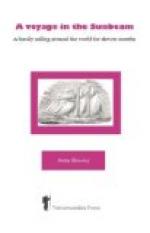The poultry market is a curious place. On account of the intense heat everything is brought alive to the market, and the quacking, cackling, gobbling, and crowing that go on are really marvellous. The whole street is alive with birds in baskets, cages, and coops, or tied by the leg and thrown down anyhow. There were curious pheasants and jungle-fowl from Perak, doves, pigeons, quails, besides cockatoos, parrots, parrakeets, and lories. They are all very tame and very cheap; and some of the scarlet lories, looking like a flame of fire, chatter in the most amusing way. I have a cage full of tiny parrots not bigger than bullfinches, of a dark green colour, with dark red throats and blue heads, yellow marks on the back, and red and yellow tails. Having bought these, everybody seemed to think that I wanted an unlimited supply of birds, and soon we were surrounded by a chattering crowd, all with parrots in their hands and on their shoulders. It was a very amusing sight, though rather noisy, and the competition reduced the prices very much. Parrakeets ranged from twelve to thirty cents apiece, talking parrots and cockatoos from one to five dollars. At last the vendors became so energetic that I was glad to get into the gharry again, and drive away to a flower shop, where we bought some gardenias for one penny a dozen, beautifully fresh and fragrant, but with painfully short stalks.
Towards the end of the south-west monsoon, little native open boats arrive from the islands 1,500 to 3,000 miles to the southward of Singapore. Each has one little tripod mast. The whole family live on board. The sides of the boat cannot be seen for the multitudes of cockatoos, parrots, parrakeets, and birds of all sorts, fastened on little perches, with very short strings attached to them. The decks are covered with sandal-wood. The holds are full of spice, shells, feathers, and South Sea pearl shells. With this cargo they creep from island to island, and from creek to creek, before the monsoon, till they reach their destination. They stay a month or six weeks, change their goods for iron, nails, a certain amount of pale green or Indian red thread for weaving, and some pieces of Manchester cotton. They then go back with the north-east monsoon, selling their goods at the various islands on their homeward route. There are many Dutch ports nearer than Singapore, but they are over-regulated, and preference is given to the free English port, where the simple natives can do as they like so long as they do not transgress the laws.
As we were going on board, we met the Maharajah of Johore’s servant, just going off with invitations to dinner, lunch, and breakfast for the next two days for all our party, and with all sorts of kind propositions for shooting and other amusements.




